FSM4 Conference - Day 1, Track 2: Case Studies Chennai, India Various authors (2017)
FSM4 was held in Chennai, Tamil Nadu, where the State Government has recently initiated measures to address FSM with regard to policy, regulatory changes, innovative solutions, and pilots. FSM4 focused on innovative and practical solutions that can be scaled up, including three tracks: research, case studies, and industry & exhibition.
Below you find the presentations held in track 2: Case Studies on Monday 20 February 2017 in chronological order.
Bibliographic information
Various authors (2017). FSM4 Conference - Day 1, Track 2: Case Studies Chennai, India
Filter / Tags
Faecal sludge treatment processesPeri-urbanUrban (entire city)Case studies in other formatsPresentationsEnglish
Downloads
Case Studies 1.1.1 Gardiner, V. et al.
Type: application/pdf
Size: 14.17 MB
Case Studies 1.1.2. Berner
Type: application/pdf
Size: 2.38 MB
Case Studies 1.1.3. Kramer
Type: application/pdf
Size: 3.84 MB
Case Studies 1.2.1. Scott
Type: application/pdf
Size: 0.86 MB
Case Studies 1.2.2. Chary
Type: application/pdf
Size: 6.72 MB
Case Studies 1.2.3. Mansuri
Type: application/pdf
Size: 4.09 MB
Case Studies 1.2.4. Reddy
Type: application/pdf
Size: 2.17 MB
Case Studies 1.3.1. Asri
Type: application/pdf
Size: 1.16 MB
Case Studies 1.3.2. Sumarni
Type: application/pdf
Size: 2.01 MB
Case Studies 1.3.3. Bustraan
Type: application/pdf
Size: 1.43 MB
Case Studies 1.3.4. Reddy
Type: application/pdf
Size: 4.5 MB
Case Studies 1.4.1. Simwambi
Type: application/pdf
Size: 0.99 MB
Case Studies 1.4.2. Rokob
Type: application/pdf
Size: 1.8 MB
Case Studies 1.4.3. Nkurunziza
Type: application/pdf
Size: 1.21 MB

